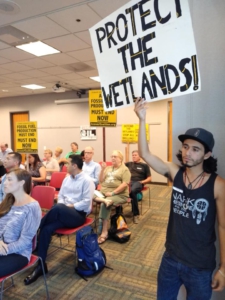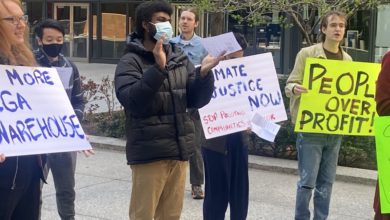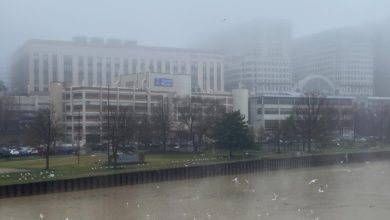
In August, a contingent of Indigenous activists and environmentalist allies turned out to voice their opposition to an item on the Coastal Commission meeting agenda, relating to coastal wetlands. The Commissioners were set to weigh in on an amendment to the city of Long Beach’s Coastal Plan, which would potentially allow Beach Oil Mineral Partners to drill for 200 million barrels of oil on two locations within the Coastal Zone, where the Local Coastal Plan does not presently allow drilling.
The California Coastal Commission was established by the will of the people, through the passage of Prop 20 in 1972, and became a fixture of the California regulatory landscape when the legislature made it a permanent body as part of the Coastal Act of 1976. The Coastal Commission describes their mission as follows:
“The Commission is committed to protecting and enhancing California’s coast and ocean for present and future generations. It does so through careful planning and regulation of environmentally-sustainable development, rigorous use of science, strong public participation, education, and effective intergovernmental coordination.”
This mission statement and indeed the California Coastal Commission website as a whole are replete with assurances that they are there to look out for California’s Coast and will keep it safe from environmental harm for the greater public good. They place a great deal of emphasis on climate change concerns and have a variety of dedicated sections addressing the various climate change threats that are presently impacting California. This includes Green House Gas emissions, Ocean Acidification and Sea Level Rise. The way they address these matters on the website places emphasis on science and links to a variety of supporting data. One of the best sections is on the looming threat of Sea Level Rise, and in that context, they link to the excellent SLR modeling tools on the National Oceanic & Atmospheric Association website.
The Coastal Commission meeting happened to occur on a day when our Southern California skies were tinted a hazy orange from the inland wild fires burning as near as Corona and Elsinore. The fire threat dominated local news coverage and it was a matter weighing on people’s minds that day. During the meeting’s morning session, we had a moment of hopefulness, when the comments of Commissioners and staff poignantly raised the matter of climate change in reference to other agenda items that day.
Commissioners speak well on climate change …
Many in the audience were heartened when Coastal Commission Executive Director Jack Ainsworth mentioned that where Sea Level Rise is concerned, the “aspirational goal” of the Coastal Act is to “preserve beaches and public access to the coast and protect our coastal habitats and resources.”
The Director’s statements were followed by comments by Commissioner Donne Brownsey that were especially notable. She asserted that “this summer” is bound to be a turning point in climate change acknowledgement and then she mentioned how she remembered reading scientific papers years ago that predicted the fires we now see throughout California and the Western states. She went on to suggest that the Coastal Commission should adopt a more “activist position” where these matters are concerned. This took many activists by surprise, and the room erupted into tentative applause at this suggestion. CCC Chairwoman Dayna Bochco then concurred, saying that she also felt that this particular summer is going to drive the reality of climate change home in undeniable ways.
As protesters returned from a lunch break though and were waiting for the afternoon session to begin, we found that the ranks of the pro-petroleum extraction contingent had managed to swell a bit. Among the newly arrived attendees to speak on behalf of the oil company initiative were Long Beach City Councilor Suzie Price and Long Beach Mayor Robert Garcia. Garcia was especially chummy with the petroleum proponents. In a moment providing insight into how one climbs the political ladder in California by easing the way for fossil fuel interests, Garcia sat right in the midst of the pro-drilling contingent engaging in animated and warm conversation accented with laughter and generally high spirits.
It was impossible not to get the sense, as Big Oil representatives have openly asserted in past comment periods, that Long Beach city officials, as well as Coastal Commission representatives, are “partners” with the oil interests. Mayor Garcia did not extend any of this mirthful friendliness toward any of those opposed to the project, even though opponents were entirely composed of Long Beach residents who he is supposed to represent. Apparently, Indigenous community members and environmentalists were not the sort of people with whom the Mayor cared to mix, being unwilling or unable, as we were, to assist with his political ambitions.
There is nothing at all to be gained for the working people of Long Beach by allowing this environmental debacle to move forward. It is wholly about profits and does nothing for the needs of the community at large despite claims to the contrary and many people in the city want to put a stop to climate change, which is only possible if we stop all new oil drilling.
But vote for increased fossil fuel extraction
Though the project proponents fixate on the “decreased footprint” of extraction, by moving drilling from the sprawling 100 plus acre property at the heart of a somewhat convoluted land swap agreement to the two smaller plots that comprise a little more than 10 acres total, the actual oil production skyrockets from 300 to 24,000 barrels a day. Emissions will be the Green House Gas equivalent of adding 11,000 cars all day, every day to local roads, for at least the 40-year duration of the main phase of the project.
Further, proponents of this petroleum extraction scheme, so enamored with the prospect of getting the 100 plus acre property back in public hands, should know that even with a mere one foot of SLR, the majority of the Synergy site at the heart of the wetlands oil scheme would be inundated by seawater. Hopefully, the proposed visitor center and hiking trails, which the oil project proponents dangle in front of the more gullible citizens of Long Beach to entice them into accepting this farce, can float.
California Air Resource Board carbon credits did not help contain the fires currently sweeping the state of California. Similarly, the rising seas will not be impressed by CARB mitigation for this project, nor will the sea level recede for the sake of the Mitigation Bank that will allow developers to destroy wetlands elsewhere in exchange for chipping in financially on restoration of wetlands devastated by petro-extraction here in Los Cerritos.
Long Beach is an oil town, with a long and entrenched history of coddling petroleum interests. It seemed the only hope for the planet and for local people opposed to the project was for a more independent body like the Coastal Commission to intercede, pumping the brakes on what is clearly a short-sighted environmental debacle. Those who are opposed to this extraction scheme pointed to a plethora of reasons, including opposition among many of the local Indigenous communities, environmental data and the Coastal Commission’s own mission in an effort to stop the project.
With only one exception, the Coastal Commissioners all voted to approve amending the Long Beach LCP to allow new drilling. As repeatedly pointed out, this will cause oil production in the vicinity of the wetlands to spike and exacerbate climate change. This remarkable disconnect between the Coastal Commissioners’ espoused mission and their actions when it comes time to vote is the epitome of hypocrisy.
The people themselves must organize and use the power of solidarity and numbers to stop all new petroleum extraction everywhere – be it in the Long Beach Wetlands or off the coast of California. We will not be aided in this struggle by elected politicians nor governmental watchdog bodies ostensibly charged with looking out for our interests. Their acknowledgments of the climate crisis but unwillingness to act beyond going on record with hollow platitudes renders these people useless as defenders of the public interest and natural environment.
With the flames from California wild fires currently engulfing communities and the imminent rise in sea level, we must come to the unavoidable conclusion that we the people can only depend on ourselves. We must acknowledge the material reality and act accordingly. Change will only come from the bottom up, when we collectively decide that we will no longer allow for ravaging the planet that sustains all life, in the interest of profits for a few.






